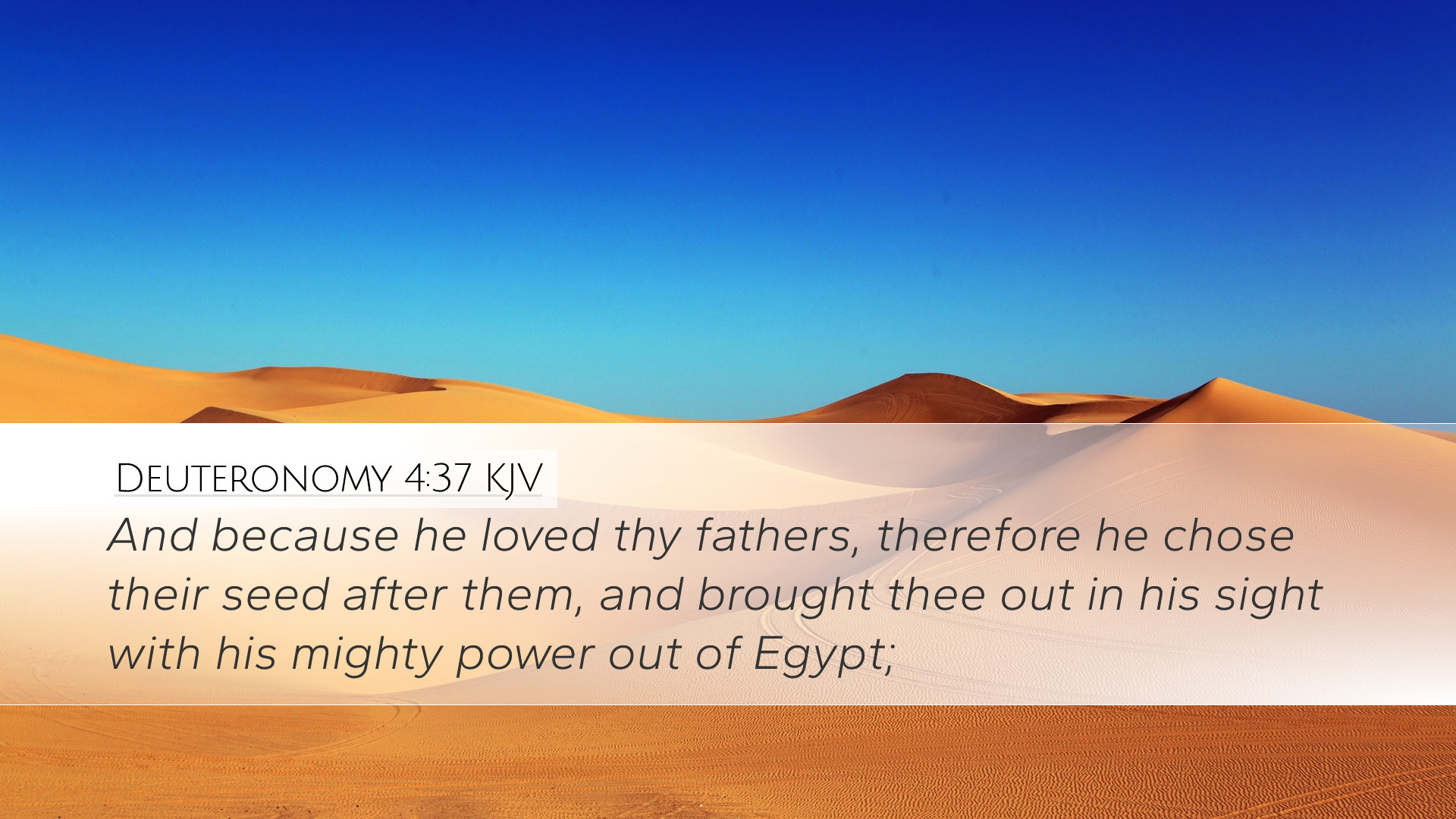Commentary on Deuteronomy 4:37
Bible Verse: "And because he loved thy fathers, therefore he chose their seed after them, and brought thee out in his sight with his mighty power out of Egypt."
Introduction
This verse is integral to understanding the nature of God's covenant with Israel. It highlights God's fidelity to His promises and His special relationship with the descendants of the patriarchs. This commentary synthesizes insights from several public domain commentaries, offering a rich exploration of the theological and historical significance of this verse.
Theological Insights
- Divine Election: The choice of Israel is a recurring theme in the Hebrew Scriptures. Matthew Henry emphasizes that God's selection was based on His love for their ancestors, not on any merit of their own. This grace-oriented selection underscores the concept of election whereby God sovereignly chooses a people for Himself.
- Continuity of Covenant: Adam Clarke discusses the continuity between the spiritual progenitors of Israel and their descendants. The verse reiterates that God's covenantal commitment spans generations, showcasing His unchanging nature and faithfulness.
- The Exodic Experience: Albert Barnes notes the historical context surrounding this declaration—that the Exodus from Egypt serves as a biblical model of deliverance. God's "mighty power" not only led Israel from physical captivity but also symbolized a spiritual transition into covenantal relationship.
Historical Context
Understanding the historical circumstances that led to the events described in Deuteronomy is essential for interpreting this verse. The Israelites had experienced significant suffering in Egypt, which made their deliverance all the more meaningful. Matthew Henry emphasizes how the narrative of bondage and subsequent liberation embodies the broader themes of sin and redemption found throughout Scripture.
The Role of the Patriarchs
The "fathers" mentioned refer to Abraham, Isaac, and Jacob. Albert Barnes highlights that God’s promises made to these patriarchs included a future of numerous descendants and a land for them to inhabit. Thus, this verse encapsulates the culmination of those promises being realized in the Exodus and the entrance into the Promised Land.
The Mighty Power of God
The phrase "mighty power" refers to God's extraordinary interventions in human history. This includes the plagues of Egypt and the parting of the Red Sea, events that demonstrated His sovereignty and ability to fulfill His promises. Clarke notes that such acts are fundamental to understanding God’s character—He is both merciful and powerful.
Practical Applications
- Encouragement for Believers: The assurance of God’s love and faithfulness is a source of strength for believers. Just as He was with Israel, so too is He present with His people today. This verse encourages Christians to trust in His ongoing divine guidance.
- The Importance of Remembrance: Reflecting on the past acts of God can encourage faith in future promises. Just as the Israelites were reminded of their history, so should modern believers remember God's faithfulness in their lives.
- Covenant Responsibility: The verse implies a responsibility to live in accordance with God's will after recognizing His faithfulness. It serves as a reminder that being chosen comes with the expectation of obedience.
Conclusion
Deuteronomy 4:37 is a profound reminder of God's love and fidelity throughout generations. It challenges us to recognize the significance of our spiritual heritage and the responsibilities that arise from being part of God's chosen people. By synthesizing the insights of Matthew Henry, Albert Barnes, and Adam Clarke, we gain a deeper understanding of this pivotal verse and its implications for our faith journey today.


